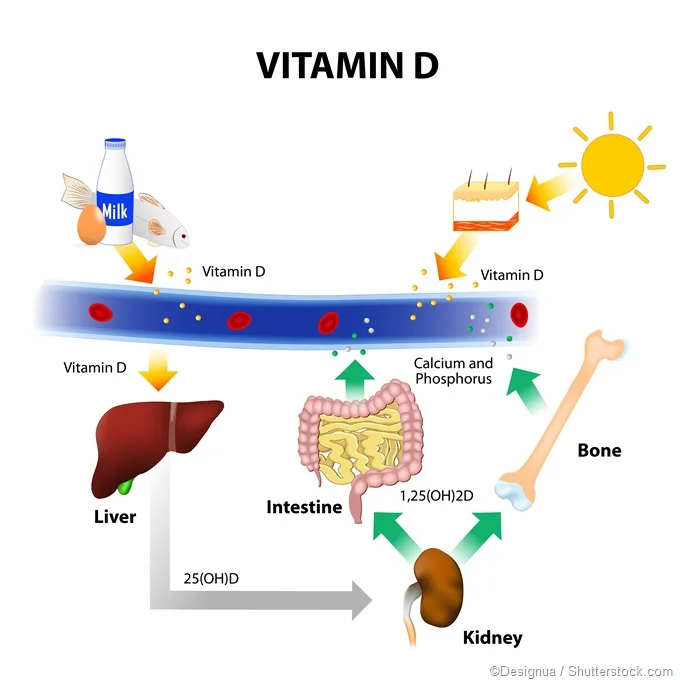Are you feeling tired, depressed or sleeping poorly? How long has it been since you last checked your vitamin D level? Vitamin D is possibly the most important of all vitamins. It´s involved in the regulation of a multitude of vital processes and is therefore considered by experts to be more of a hormone than a vitamin. However, a large part of the world’s population is deficient in vitamin D and doesn’t even know it. [1]Lips, Paul et al. “Current vitamin D status in European and Middle East countries and strategies to prevent vitamin D deficiency: a position statement of the European Calcified Tissue Society.” European journal of endocrinology vol. 180,4 (2019): P23-P54. doi:10.1530/EJE-18-0736https://pubmed.ncbi.nlm.nih.gov/30721133/
Vitamin D deficiency is closely related to sleep problems and many other disorders such as tiredness, fatigue, weak bones, pain or depression. If you have intermittent, poor quality sleep and feel tired during the day, vitamin D deficiency could be the cause (or part of the problem).In today’s article, we’ll tell you everything you need to know about vitamin D to improve your health: what vitamin D is good for, how it influences sleep, and what vitamin D supplement you can take to sleep better.
The problem of vitamin D deficiency and how it influences sleep
As we´ve mentioned, much of the population is vitamin D deficient and this may be affecting their quality of sleep.
But why do so many people have vitamin D deficiency? The explanation is simple, it’s due to our lifestyle habits.
Most of the vitamin D (90%) we get from the sun is synthesized in our skin from cholesterol through a chemical reaction that requires UVB ultraviolet rays.
The other 10% of the vitamin D we synthesize comes from our food.
Our current way of life is the main cause of the problem. We´ve gone from living outdoors all the time, to spending the day enclosed within four walls, away from natural light and solar radiation.
In addition, successive information campaigns on the sun´s dangers have been deeply rooted in the population, causing many to use too much sunscreen, preventing our skin from receiving the minimum solar radiation necessary to obtain the sufficient amount of vitamin D that we need.
In short, we get too little sun and apply more sunscreen than necessary.
Why vitamin D is so important for healthy sleep
More and more scientific experiments point to the fundamental role of vitamin D in sleep. Here’s why we need to have an adequate level of vitamin D for healthy sleep.
Vitamin D receptors have been found in parts of the brain involved in sleep regulation. In fact, the role of this vitamin in the regulatory mechanisms of the sleep-wake cycle is currently being investigated. [2]Gao, Qi et al. “The Association between Vitamin D Deficiency and Sleep Disorders: A Systematic Review and Meta-Analysis.” Nutrients vol. 10,10 1395. 1 Oct. 2018, doi:10.3390/nu10101395
In addition, several studies have shown that providing vitamin D to people with deficiency can improve sleep quality, reduce sleep latency, increase sleep duration and improve subjective sleep quality [3]Majid, Mohammad Shahi et al. “The effect of vitamin D supplement on the score and quality of sleep in 20-50 year-old people with sleep disorders compared with control group.” Nutritional neuroscience vol. 21,7 (2018): 511-519. doi:10.1080/1028415X.2017.1317395 [4]Kim, Jeong Hong et al. “Association between self-reported sleep duration and serum vitamin D level in elderly Korean adults.” Journal of the American Geriatrics Society vol. 62,12 (2014): 2327-32. doi:10.1111/jgs.13148 [5]Massa, Jennifer et al. “Vitamin D and actigraphic sleep outcomes in older community-dwelling men: the MrOS sleep study.” Sleep vol. 38,2 251-7. 1 Feb. 2015, doi:10.5665/sleep.4408
Vitamin D also seems to be related to the production of melatonin, the sleep hormone. Although we still need more studies to understand this relationship, it seems that vitamin D is related to serotonin, regulating its production. This neurotransmitter, which is obtained through tryptophan, is essential to generate adequate levels of melatonin, the hormone that plays a fundamental role in sleep. [6]Ghareghani, Majid et al. “Latitude, Vitamin D, Melatonin, and Gut Microbiota Act in Concert to Initiate Multiple Sclerosis: A New Mechanistic Pathway.” Frontiers in immunology vol. 9 2484. 30 Oct. 2018, doi:10.3389/fimmu.2018.02484 [7]Romano, Fiammetta et al. “Vitamin D and Sleep Regulation: Is there a Role for Vitamin D?.” Current pharmaceutical design vol. 26,21 (2020): 2492-2496. doi:10.2174/1381612826666200310145935
The relationship between vitamin D deficiency and the onset of various sleep disorders such as apnea is becoming increasingly clear [8]Bozkurt, N Colak et al. “The relation of serum 25-hydroxyvitamin-D levels with severity of obstructive sleep apnea and glucose metabolism abnormalities.” Endocrine vol. 41,3 (2012): 518-25. doi:10.1007/s12020-012-9595-1 [9]Gao, Qi et al. “The Association between Vitamin D Deficiency and Sleep Disorders: A Systematic Review and Meta-Analysis.” Nutrients vol. 10,10 1395. 1 Oct. 2018, doi:10.3390/nu10101395 .This could be related to our microbiome.
Although we still have a lot to understand about the microbiome, all experts agree on the importance of having a good microbiome (a good number and diversity of “good” bacteria in our gut) to stay healthy. A poor state of the microbiome, known as gut dysbiosis, is linked to the onset of a multitude of diseases, including, for example, autoimmune diseases.
Today we know that the state of our microbiome also affects our sleep. Several studies have shown that intestinal dysbiosis causes sleep problems [10]Matenchuk, Brittany A et al. “Sleep, circadian rhythm, and gut microbiota.” Sleep medicine reviews vol. 53 (2020): 101340. doi:10.1016/j.smrv.2020.101340 and that a good microbiome improves our sleep quality.
This is where vitamin D comes into play as it appears to be essential to maintain adequate levels of this vitamin for a healthy microbiome [11]Akimbekov, Nuraly S et al. “Vitamin D and the Host-Gut Microbiome: A Brief Overview.” Acta histochemica et cytochemica vol. 53,3 (2020): 33-42. doi:10.1267/ahc.20011 .
As we´ve seen, and although we still have much to discover, it seems increasingly clear that having adequate levels of vitamin D is essential to sleeping well and staying healthy.
How to improve our vitamin D levels?
There are three ways to improve our vitamin D levels:
- Increase our sun exposure
- Increase the intake of foods rich in vitamin D
- Take a vitamin D supplement
As we´ve explained above, we get most of our vitamin D from the sun and a small portion from our food. Therefore, a good way to improve our vitamin D levels would be to spend more time outdoors in the sun without applying sunscreen.
This doesn’t mean that we should stop protecting our skin from the sun, especially during the hours when solar radiation is strongest (from 12 noon to 4 p.m.), but rather that we should expose ourselves to the sun in an intelligent way, to take advantage of its benefits without harming ourselves. For example, walking in the sun during the early morning or late afternoon without sunscreen, or applying sunscreen 20 minutes after arriving at the beach instead of leaving the house with sunscreen on.
If you go to the office by car or public transportation, getting off a couple of stops earlier (or parking farther away) is an easy way to increase the daily minutes of sun exposure and get a bit more exercise.
Another thing that can help is to increase the consumption of foods rich in vitamin D such as oily fish (mackerel, sardines, anchovies, etc.), eggs, butter, avocado, etc.
Finally, and perhaps the simplest way, would be to take vitamin D in supplement form.
What else vitamin D is good for – Other vitally important functions beyond sleep
Vitamin D is considered a hormone because of its multiple regulatory functions in the body.
Its best known function is to help metabolize calcium in the bones. However, it’s also involved in other processes that are fundamental for health, such as:
- cell multiplication and death
- regulation of the immune system
- regulation of insulin secretion
- the learning process and memory
- motor control
- brain aging
- etc
Vitamin D is involved in the maintenance of natural immunity, prevention of infections, autoimmune diseases, 15 types of cancer, osteoporosis, cardiovascular diseases, diabetes mellitus types 1 and 2 and psychiatric diseases. [12]C. Alonso López, N. Ureta Velasco, C.R. Pallás Alonso, C.R. Pallás Alonso y Grupo PrevInfada Vitamina D profiláctica Rev Pediatr Aten Primaria vol.12 no.47 Madrid jul./sep. 2010
Some studies have shown that it helps relieve chronic pain, improving patients’ quality of life. [13]Huang, Wei et al. “Improvement of pain, sleep, and quality of life in chronic pain patients with vitamin D supplementation.” The Clinical journal of pain vol. 29,4 (2013): 341-7. doi:10.1097/AJP.0b013e318255655d It also reduces the risk of falls in older adults.In addition, receptors for vitamin D have been detected in almost all human tissues, and its ability to regulate the expression of numerous genes has also been discovered. [14]Gómez de Tejada Romero M.J. Acciones extraóseas de la vitamina D Rev Osteoporos Metab Miner vol.6 supl.1 Madrid mar. 2014
FAQ – Frequently Asked Questions about Vitamin D
The answers to the most frequently asked questions about vitamin D.
How do I know if I have vitamin D deficiency?
You can check your vitamin D levels with a simple blood test.
What are the optimal levels of vitamin D in the body?
The optimal range would be between 50-60 and 80 nanograms per milliliter. [15]C. Alonso López, N. Ureta Velasco, C.R. Pallás Alonso, C.R. Pallás Alonso y Grupo PrevInfada Vitamina D profiláctica Rev Pediatr Aten Primaria vol.12 no.47 Madrid jul./sep. 2010
Is it dangerous to have low vitamin D?
Vitamin D is essential to keep us healthy. A vitamin D deficiency can trigger diseases as it weakens our immune system. If you have vitamin D levels lower than 50 nanograms per milliliter, consult your doctor.
Can excess vitamin D be a problem?
Yes, according to Dr. Stasha Gominak (sleep expert), an excess of vitamin D (values above 90 nanograms per milliliter) could be harmful and cause the same sleep problems as vitamin D deficiency.
What dose of vitamin D should I take?
It depends on several factors such as the time of the year, the country you live in, the amount of sun exposure you receive daily and especially the level of vitamin D you have before you start taking a supplement.
For people with vitamin D deficiency, the general recommendation would be to take about 5,000 IU of vitamin D per day. Then a blood test should be done to see how the levels have evolved and to know whether to increase or reduce that daily dose.
If you´re already starting from a healthy vitamin D level (between 60-80 nanograms per milliliter), you can take much lower doses to maintain healthy levels, as long as you combine it with spending some time outdoors each day.
How often should I measure my vitamin D levels?
Ideally, we should perform about four routine blood tests per year to ensure that our levels always remain within the recommended range of 50-80 nanograms per milliliter.
Does vitamin D help improve sleep?
Yes, several studies have shown that providing vitamin D to people with deficiency can improve sleep quality, reduce sleep latency, increase sleep duration and improve subjective sleep quality.
[16]Majid, Mohammad Shahi et al. “The effect of vitamin D supplement on the score and quality of sleep in 20-50 year-old people with sleep disorders compared with control group.” Nutritional neuroscience vol. 21,7 (2018): 511-519. doi:10.1080/1028415X.2017.1317395 [17]Kim, Jeong Hong et al. “Association between self-reported sleep duration and serum vitamin D level in elderly Korean adults.” Journal of the American Geriatrics Society vol. 62,12 (2014): 2327-32. doi:10.1111/jgs.13148 [18]Massa, Jennifer et al. “Vitamin D and actigraphic sleep outcomes in older community-dwelling men: the MrOS sleep study.” Sleep vol. 38,2 251-7. 1 Feb. 2015, doi:10.5665/sleep.4408
Vitamin D has also been found to be involved in the production of melatonin, the sleep hormone.
How can you naturally increase the levels of this vitamin?
This can be accomplished by increasing sun exposure, eating foods rich in vitamin D or taking a supplement containing vitamin D3.
When we talk about increasing sun exposure we mean increasing the time we spend outdoors, exposed to the sun´s radiation without the use of sunscreen. Sunscreen protects us from sunburn but it also prevents our skin from being able to absorb vitamin D.
Why does using sunscreen block vitamin D absorption?
Vitamin D is synthesized in our skin from cholesterol through a chemical reaction that requires ultraviolet UVB rays. If your sunscreen has UVB protection, this will prevent your skin from synthesizing vitamin D in your body.
What foods are rich in Vitamin D?
Vitamin D is fat-soluble and is present in foods rich in healthy fats. Some of the foods that provide the most vitamin D are:
- Eggs
- Oily fish: sardines, mackerel, anchovies, wild salmon, etc.
- Liver
- Dairy products (cheese, yogurt)
- Mushrooms
- Butter from grass-fed animals
- Avocado
- Etc.
What is the best time of day to take a vitamin D supplement?
Preferably in the morning or with lunch. Take it with the largest meal of the day and with foods rich in healthy fats to promote absorption. [19]Mulligan, Guy B, and Angelo Licata. “Taking vitamin D with the largest meal improves absorption and results in higher serum levels of 25-hydroxyvitamin D.” Journal of bone and mineral research : the official journal of the American Society for Bone and Mineral Research vol. 25,4 (2010): 928-30. doi:10.1002/jbmr.67 [20]Dawson-Hughes, Bess et al. “Dietary fat increases vitamin D-3 absorption.” Journal of the Academy of Nutrition and Dietetics vol. 115,2 (2015): 225-230. doi:10.1016/j.jand.2014.09.014
Which people are most likely to suffer from vitamin D deficiency?
Dark-skinned people, people who spend a lot of time indoors, or who always use sunscreen when going outdoors. Also elderly people or people with an unbalanced diet (or who don’t eat foods rich in this vitamin).
What are the symptoms of vitamin D deficiency?
Vitamin D deficiency can manifest itself through various symptoms such as: weakening of the immune system, fatigue, bone pain, muscle weakness, muscle pain or cramps, mood swings, excessive sweating, weight gain, increased blood pressure, hair loss, lack of concentration, etc.
Is vitamin D fattening?
No, vitamin D is not fattening. In fact, one of its functions is to regulate insulin, so having adequate levels of vitamin D can promote a healthy weight.
Some vitamin D accumulates in fatty tissues, so overweight people may need more vitamin D than people who are within the recommended body mass index to maintain healthy blood levels.
What diseases are caused by a lack of vitamin D?
Vitamin D deficiency is associated with a multitude of diseases of varying severity. It can cause bone weakness, muscle problems, limb pain, cardiovascular diseases, sleep disorders, cancer, type 2 diabetes, weakened immune system, cognitive disorders, dementia, autoimmune diseases, rickets, etc. [21]C. Alonso López, N. Ureta Velasco, C.R. Pallás Alonso, C.R. Pallás Alonso y Grupo PrevInfada Vitamina D profiláctica Rev Pediatr Aten Primaria vol.12 no.47 Madrid jul./sep. 2010
Now you know the importance of maintaining healthy vitamin D levels to sleep well, prevent disease and maintain a good quality of life. Don’t forget to check your vitamin D several times a year and don’t hesitate to take a vitamin D supplement when necessary, your health will thank you!
If you want more information about these and other supplements that can improve sleep, visit our post about the most effective natural sleeping pills according to science.
Other sleep solutions
Many sleeping problems are due to physiological or psychological disorders, but there are also external factors that can cause insomnia or make it worse.
The pillars of a good night’s sleep are comfort, relaxation, darkness, and silence or ambient sounds. If you’re missing any one of these pillars, your sleep may be compromised.
Fortunately, there are many ways you can improve your sleep. Check out other sleep solutions by reading the full article: 27 Tips to sleep better
Relaxation
- Essential oils for sleep. Some oils have the property of transforming and balancing our emotions, reducing anxiety, depression or mental fatigue.
- Infusions for sleep. A natural remedy used for hundreds of years to induce sleep
Darkness
- Sleep masks. Provide the darkness your brain needs to produce melatonin and induce sleep naturally.
- Blue light blocking glasses. Block blue light from electronic devices and artificial lights that inhibit the production of melatonin in the brain.
Silence or ambient sounds
- Ear plugs. Silence can help you relax and enjoy a good night’s sleep.
- Sleep headphones. Ergonomic headphones for people who need a sound stimulus to sleep.
- White noise machines. Prevent noise from waking you up at night without having to wear headphones.
Comfort
- Mattresses for better sleep. Provide you with the comfort and temperature you need to have a good rest.
Interested in learning more about how you sleep?
Sleep tracking devices have all of the technological features needed to track and monitor your sleep. By measuring your heart rate, listening to your breathing patterns, and detecting your movements, sleep trackers can teach you a lot about how you sleep.
Referencias







